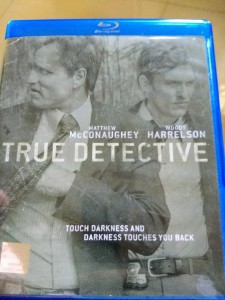There’s a beautiful scene in the movie ‘Seven’ where the two homicide detectives meet for dinner. The young wife strikes a conversation with his husbands’ work partner and after a long time the senior detective enjoys a chat with a living human being. She is drawn to his avuncular appearance and sensing him to be all ears, speaks her heart out. He tries to dispel her doubts with the goodness of life, even while harboring a deep pessimism about it. But he doesn’t know how bad it would eventually turn out. The end makes him reconsider his retirement plans and get back to the dark alleys of New York City and even darker human minds.
‘True Detective’ season one, has a similar scene, which just like in ‘Seven’, a dinner happens on the insistence of wife and to her husband Marty’s surprise, Rust stays on after having shown up thoroughly drunk. This is an important scene early on, as it dispels any notion of humanizing Rust’s character. He is cold and a facts checker—the tax man as is he called, who carries a big note book all the time. In many ways ‘True Detective’ is Rust Cohle’s (Matthew McConaughey) story, his perspective of the world, while Marty Hart (Woody Harrelson) fills in whichever way he can.
Typically, a buddy cop story plays out a few themes where the contrast between the two comes out in the open. Be it experienced & rookie clashes; outsider & insider tussles; loner & a family man dilemmas; love & hate outbursts…all these help in developing sub plots and the emotional fabric of the story. But most important of all is the inherent theme, which is Light versus darkness. As the two traverse across dark territories and even risk losing their mind while at it, it is that belief in some goodness…a sense of light overcoming darkness that gives them an intangible drive and provides story an overall purpose. It is precisely this reason that they manage somehow to come back to what they call a ‘home’ and attempt to be normal.
If Marty’s conception of a home is a wife and two kids, Rush’s sparsely furnished idea pad is what keeps him sane and focused. It is the same with other detective characters from movies like David Mills (Brad Pitt), William Somerset (Morgan Freeman) in ‘Seven’; Martin Riggs (Mel Gibson) and Roger Murtaugh (Danny Glover) in ‘Lethal Weapon’ series and even David Callahan(Clint Eastwood) from the ‘Dirty Harry’ series). It’s all about how they unwind and find a safer haven tucked away from the reality is what keeps them going (including Holmes and Watson and their Baker Street 221A).
‘True Detective’ works primarily because its gets the buddy cop thing right, and tinkers the main themes just enough to make them appealing and new. For instance, Marty is a family man but has Paul Vitti (Robert De Niro) in ‘Analyse this’ kind of ideas to find excitement outside his married life to stay committed to his family. Rust is the Holmes equivalent of a loner with a terrific mind that excels at the expense of having any decent human connection. But the writer creates a back story to give the viewers something to identify with and cheer him to solve the horrid case. Marty and Rust complement the experienced and rookie angle…if Marty is better socially, Rust is very good at the job at hand. Towards the end of the season one, Marty becomes more like Watson, while Rust seems to find his human bearings afterall, when he says this lovely dialogue. “Well, once there was only dark. If you ask me, the light’s winning”
Any good TV series ought to create the right milieu for believability and most importantly create enough diversions to keep the audience guessing. ‘True Detective’ does this very well, right from the episode one where you get a feeling that something might cook between Rust and Marty’s wife, to the confrontation scenes between Rust and Marty. And thankfully, it doesn’t go ‘The Silence of Lambs’ route, limits the cat and mouse chase and keeps the murderer tucked in to the last.
Overall, season 1 is a good watch especially if you like movie like ‘Seven’, ‘Spotlight’, ‘The Silence of Lambs’ etc.
Tailpiece: So what keeps these crusaders hooked on to the last? Is it a thrill of solving a mystery or the hope of finding something good in the real murky world. Or is it because they are so good at what they are doing, they can’t imagine quitting. May be it’s a combination of all these. David Fincher would have thrown some light on it, had William Somerset returned for an encore?

